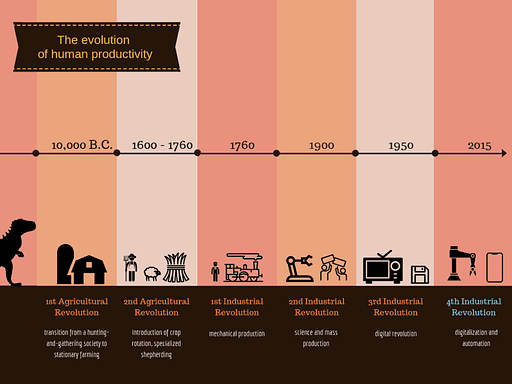Is robotic process automation the wind of change for the current economy?
The economic history of the world is a record of remarkable milestones changing the industrial development. Are we facing a new revolution right now or is this just a slogan pushed by self-proclaimed “tech evangelists”?
The history of market revolutions takes us back to times when humanity began to realize that growing crops might be a more far-sighted strategy than depending on luck against animals in daily hunts. Stationary farming resulted in the growth of merchandise, with trading routes developing certain regions to new levels. Over time, available possibilities grew old and insufficient, leading to next big steps for human productivity and market development. Transitioning from hand production methods to machines, followed by use of new technologies driven by iron and steam, brought the era of manufacturing facilities – the First Industrial Revolution, a major turning point in human history. About a century later, the Second Industrial Revolution changed the world by fueling the factories with electricity, gas, and oil, at the same time enabling better communication due to the invention of the telegraph and the telephone. In the second half of the 20th century, the Third Industrial Revolution made us witnesses of the rise of electronics, usage of nuclear energy, and space research. Now, at the beginning of the 21st century, we’re observing numerous inventions and technologies believed to change the world in a way similar to previous three revolutions – a breakthrough in how the market, business, and humanity function.

Read also: 6 small business technology trends
The sole existence of technology isn’t miraculously improving the economy. It’s how the tech is changing our work and how we work, the way we run our businesses. Numerous technologies are advertised as revolutionary, disruptive, and world-changing. In reality, they only offer a slight improvement to present solutions or revolutionize just a narrow range of application. Market revolutions show that, after utilizing all available means, humanity needs new processes, instruments, and/or techniques to develop further. What comes next is a period where the existing technology (or a set of technologies) is replaced by its successors, being more advanced and innovative.
The history of industrial revolutions shows that each technological leap brings economic growth – each advancement in production, manufacturing results in rapid growth of GDP per capita. The gross domestic product will be (actually, already is) affected by automation. As the McKinsey & Company report shows, the average annual GDP growth in the years 2020-2030 might be higher by over 1 percentage point. Doesn’t it sound stunning? That’s just the beginning and the mark of significant benefits for companies introducing RPA. New technologies lead to increasing profit, due to growth in productivity, but also due to stimulating the market demand. Authors of the report suggest companies invest in new technologies not only through implementing RPA but also by adjusting their business processes and structures. In upcoming years, various industries will undergo a critical transformation thanks to automation – this includes transport, mining, and manufacturing, to name a few. What is also crucial, automation itself isn’t an unambiguous threat to the labor force, as the process generates new possibilities. Employees may benefit from these processes as well, as RPA relieves them of the most mundane, hated tasks and the connected pressure. What the report clearly shows, automation relieves companies of stress created within them due to audits and bureaucracy, meaning that it is not only shareholders and customers who benefit, but also the employees.
According to researchers, RPA, machine learning, and AI are not only growing in prevalence, but are reshaping our reality. There are novelties to novelties – “fog” computing is breathing down cloud computing’s neck, as some intelligent devices do not send the gathered data to the cloud but analyze it themselves. Mobile technology is constantly changing, and, in consequence, changing the modern business. Research shows that approximately half of the full-time employees do not work from behind their desks and 2016 changed the proportion of users accessing the Internet via mobile, not desktop, devices. The proportions differ, regarding particular markets, but most probably, the Western world chases China, with their over 70% of users of mobile devices. Although it is always a challenge to predict upcoming trends, these tendencies are clearly visible – mobile grows, taking the cloud, AI, IoT, and others along with it. According to Deloitte data, the use of automation tasks, including AI, may lead to potential savings of over 40 billion dollars and 1.2 billion of hours freed from certain tasks.
RPA possibilities emerged right in time to assist the market to rise after the global crisis in 2008 and enter the new millennium in style. We’re not saying that with the common implementation of RPA processes humanity will focus only on creative activities, but what we know for sure is that a new revolution is on the rise.

